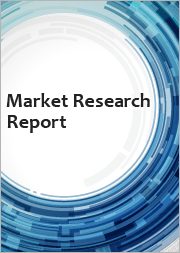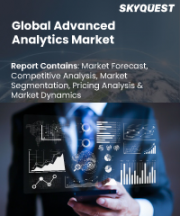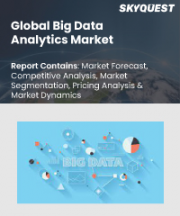
|
시장보고서
상품코드
1734845
빅데이터 분석 시장 예측(-2032년) : 컴포넌트별, 전개 모드별, 분석 유형별, 조직 규모별, 용도별, 최종 사용자별, 지역별 분석Big Data Analytics Market Forecasts to 2032 - Global Analysis By Component (Software, Services and Other Components), Deployment Mode, Analytics Type, Organization Size, Application, End Users and By Geography |
||||||
Stratistics MRC에 따르면 세계의 빅데이터 분석 시장은 2025년에 785억 2,000만 달러, 2032년에는 1,635억 4,000만 달러에 달할 것으로 예측되며, 예측 기간 동안 CAGR은 11.0%를 나타낼 전망입니다.
빅데이터 분석은 크고 복잡한 데이터 세트를 조사하여 숨겨진 패턴, 상관관계, 시장 동향 및 고객 선호도를 발견하는 프로세스를 말합니다. 머신 러닝, 데이터 마이닝, 통계 분석과 같은 고급 기술을 사용하여 조직은 정보에 입각한 의사 결정을 내리고 운영 효율성을 높이며 경쟁 우위를 확보할 수 있습니다. 빅데이터에서 얻은 인사이트는 다양한 산업 분야에서 예측 분석, 실시간 모니터링, 전략적 비즈니스 계획 수립에 도움이 됩니다.
글로벌 데이터 관리 벤치마크 보고서에 따르면, 현재 43%의 조직이 실시간 데이터 분석을 최우선 순위로 고려하고 있으며, 이는 실시간 인사이트를 활용하는 방향으로 운영 전략이 변화하고 있음을 반영합니다.
데이터 생성 급증
기업과 조직은 방대한 양의 정형 및 비정형 데이터를 생성하고 있으며, 이에 따라 고급 분석 솔루션이 절실히 요구되고 있습니다. IoT, 소셜 미디어 상호 작용, 클라우드 컴퓨팅의 확산은 이러한 성장을 더욱 촉진하고 있습니다. 기업들이 데이터 기반 의사결정을 우선시하면서 실시간 분석에 대한 수요가 증가하고 있습니다. AI와 머신러닝의 발전으로 대규모 데이터 세트를 효과적으로 처리할 수 있는 능력이 향상되고 있습니다. 그 결과, 빅데이터 분석 시장은 여러 산업 분야에서 크게 확장되고 있습니다.
데이터 프라이버시 및 보안 문제
대량의 민감한 정보를 다루는 기업은 엄격한 규제 프레임워크를 준수하는 데 어려움을 겪고 있습니다. 사이버 위협, 데이터 유출, 무단 액세스는 시장 도입을 방해하는 잠재적 위험 요소입니다. 조직은 이러한 위험을 완화하기 위해 암호화, 인증 프로토콜, 사이버 보안 조치에 많은 투자를 해야 합니다. 개인 식별 정보(PII) 처리의 복잡성으로 인해 규제 조사가 한층 더 까다로워졌습니다. 따라서 데이터 활용도를 극대화하면서 개인정보 보호 문제를 해결하는 것은 업계 종사자들에게 여전히 중요한 과제입니다.
클라우드 기반 솔루션의 채택 증가
클라우드 플랫폼은 확장 가능한 인프라를 제공하여 기업이 대규모 데이터 세트를 효율적으로 처리할 수 있도록 지원합니다. 원활한 통합, 향상된 협업, 비용 효율적인 분석 구현을 위해 클라우드 컴퓨팅으로 전환하는 조직이 점점 더 많아지고 있습니다. 하이브리드 클라우드 솔루션의 발전으로 데이터를 안전하게 저장하고 처리하는 동시에 비즈니스 연속성을 보장할 수 있습니다. 이러한 추세는 빅데이터 분석 분야에서 광범위한 채택과 혁신을 촉진할 것으로 예상됩니다.
부정확하거나 오해의 소지가 있는 인사이트의 위험
데이터의 품질과 신뢰성은 분석 기반 의사 결정의 결과에 큰 영향을 미칩니다. 데이터 불일치, AI 모델의 편향성, 부실한 데이터 거버넌스와 같은 문제는 잘못된 해석으로 이어질 수 있습니다. 조직은 정확성을 높이기 위해 강력한 데이터 검증 및 정리 메커니즘을 확보해야 합니다. 과거 데이터 트렌드에 의존하면 새로운 시장 변화를 간과하여 전략 계획에 영향을 미칠 수 있습니다.
COVID-19의 영향
COVID-19 팬데믹은 빅데이터 분석의 도입을 가속화하여 전 세계 산업을 변화시켰습니다. 기업들이 전례 없는 혼란에 직면하자, 회복탄력성과 위험 평가를 위해 분석에 눈을 돌렸습니다. 의료 부문에서는 데이터 분석을 활용하여 발병을 추적하고, 리소스를 최적화하고, 환자 치료 전략을 개선했습니다. 원격 근무 트렌드로 인해 클라우드 기반 데이터 처리에 대한 의존도가 더욱 높아졌습니다. 팬데믹 이후에도 기업들은 불확실성을 극복하고 운영 효율성을 최적화하기 위해 데이터 기반 인사이트를 우선순위에 두고 있습니다.
소프트웨어 부문은 예측 기간 동안 가장 큰 규모가 될 전망
소프트웨어 부문은 고급 분석 솔루션에 대한 의존도가 증가함에 따라 예측 기간 동안 가장 큰 시장 점유율을 차지할 것으로 예상됩니다. 기업들은 생산성과 의사결정을 향상시키기 위해 AI 기반 분석 플랫폼에 막대한 투자를 하고 있습니다. 예측 분석, 시각화 도구, 자동화된 보고 기능에 대한 수요는 계속 확대되고 있습니다. 클라우드 기반 분석 소프트웨어는 기존 비즈니스 프레임워크와 원활하게 통합되어 도입을 촉진하고 있습니다.
영업 분석 부문은 예측 기간 동안 가장 높은 CAGR을 보일 전망
예측 기간 동안 영업 분석 부문은 고객 인텔리전스에 대한 수요 증가로 인해 가장 높은 성장률을 보일 것으로 예상됩니다. 기업은 판매 분석을 활용하여 가격 전략을 최적화하고, 수요를 예측하며, 수익 창출을 향상시킵니다. AI 기반 분석 도구는 패턴과 트렌드를 파악하여 기업이 마케팅 캠페인을 개선할 수 있도록 도와줍니다. 자동화와 머신러닝의 통합으로 리드 생성의 정확도와 전환율이 향상됩니다. 데이터 기반 영업 전략에 대한 필요성이 이 부문의 강력한 성장을 견인하고 있습니다.
최대 점유율을 차지하는 지역 :
예측 기간 동안 아시아태평양 지역은 디지털 환경의 확대로 인해 가장 큰 시장 점유율을 차지할 것으로 예상됩니다. 급속한 경제 발전과 기술 발전으로 인해 산업 전반에 걸쳐 높은 채택률을 보이고 있습니다. 각국 정부는 인프라 및 규제 프레임워크를 강화하기 위해 빅데이터 노력에 막대한 투자를 하고 있습니다. 모바일 연결과 전자상거래의 확산은 분석 솔루션에 대한 수요를 더욱 촉진하고 있습니다.
CAGR이 가장 높은 지역 :
예측 기간 동안 북미 지역은 분석 기술에 대한 상당한 투자로 인해 가장 높은 CAGR을 보일 것으로 예상됩니다. 이 지역은 빅데이터 처리의 혁신을 선도하는 주요 기술 기업들의 본거지입니다. 기업들은 비즈니스 최적화, 리스크 관리, 고객 참여를 위해 AI 기반 분석을 적극적으로 구현하고 있습니다. 엄격한 데이터 보호 규정은 안전한 분석 플랫폼의 도입을 촉진합니다. 클라우드 기반 인프라의 발전은 여러 부문에서 확장성과 효율성을 더욱 향상시킵니다.
무료 맞춤화 서비스 :
이 보고서를 구독하는 고객은 다음 무로 맞춤화 옵션 중 하나를 사용할 수 있습니다.
- 기업 프로파일
- 추가 시장 기업의 종합적 프로파일링(최대 3개사)
- 주요 기업의 SWOT 분석(최대 3개사)
- 지역 세분화
- 고객의 관심에 응한 주요국 시장 추계, 예측 및 CAGR(참고 : 타당성 확인에 따라 다름)
- 경쟁 벤치마킹
- 제품 포트폴리오, 지리적 존재, 전략적 제휴에 기반한 주요 기업 벤치마킹
목차
제1장 주요 요약
제2장 서문
- 개요
- 이해관계자
- 조사 범위
- 조사 방법
- 데이터 마이닝
- 데이터 분석
- 데이터 검증
- 조사 접근
- 조사 자료
- 1차 조사 자료
- 2차 조사 자료
- 전제조건
제3장 시장 동향 분석
- 성장 촉진요인
- 억제요인
- 기회
- 위협
- 용도 분석
- 최종 사용자 분석
- 신흥 시장
- COVID-19의 영향
제4장 Porter's Five Forces 분석
- 공급기업의 협상력
- 구매자의 협상력
- 대체품의 위협
- 신규 참가업체의 위협
- 경쟁 기업간 경쟁 관계
제5장 세계의 빅데이터 분석 시장 : 컴포넌트별
- 소프트웨어
- 데이터 검출 및 시각화 도구
- 보고서 도구
- 데이터 마이닝과 웨어하우스
- 예측 분석 도구
- 서비스
- 매니지드 서비스
- 전문 서비스
- 기타 컴포넌트
제6장 세계의 빅데이터 분석 시장 : 전개 모드별
- 온프레미스
- 클라우드 기반
- 하이브리드 클라우드
- 퍼블릭 클라우드
- 프라이빗 클라우드
제7장 세계의 빅데이터 분석 시장 : 분석 유형별
- 예측 분석
- 규범적 분석
- 기술적 분석
- 진단 분석
제8장 세계의 빅데이터 분석 시장 : 조직 규모별
- 대기업
- 중소기업
제9장 세계의 빅데이터 분석 시장 : 용도별
- 고객 분석
- 영업 분석
- 위험 및 사기 탐지
- 마케팅 분석
- 운용 분석
- 공급망 분석
- 기타 용도
제10장 세계의 빅데이터 분석 시장 : 최종 사용자별
- 은행, 금융서비스 및 보험(BFSI)
- 정부 및 공공 부문
- 의료 및 생명과학
- 운송 및 물류
- 소매 및 전자상거래
- 교육
- 제조업
- 에너지 및 유틸리티
- 통신 및 IT
- 미디어 및 엔터테인먼트
- 기타 최종 사용자
제11장 세계의 빅데이터 분석 시장 : 지역별
- 북미
- 미국
- 캐나다
- 멕시코
- 유럽
- 독일
- 영국
- 이탈리아
- 프랑스
- 스페인
- 기타 유럽
- 아시아태평양
- 일본
- 중국
- 인도
- 호주
- 뉴질랜드
- 한국
- 기타 아시아태평양
- 남미
- 아르헨티나
- 브라질
- 칠레
- 기타 남미
- 중동 및 아프리카
- 사우디아라비아
- 아랍에미리트(UAE)
- 카타르
- 남아프리카
- 기타 중동 및 아프리카
제12장 주요 발전
- 계약, 파트너십, 협업, 합작투자
- 인수와 합병
- 신제품 발매
- 사업 확대
- 기타 주요 전략
제13장 기업 프로파일링
- IBM
- Microsoft
- Oracle
- SAP
- Amazon Web Services
- SAS Institute Inc.
- Salesforce
- Teradata
- Cloudera
- Accenture
- Wipro
- Infosys
- Mu Sigma
- Genpact
According to Stratistics MRC, the Global Big Data Analytics Market is accounted for $78.52 billion in 2025 and is expected to reach $163.54 billion by 2032 growing at a CAGR of 11.0% during the forecast period. Big Data Analytics refers to the process of examining large and complex data sets to uncover hidden patterns, correlations, market trends, and customer preferences. Using advanced techniques such as machine learning, data mining, and statistical analysis, it enables organizations to make informed decisions, enhance operational efficiency, and gain a competitive edge. The insights derived from big data help in predictive analytics, real-time monitoring, and strategic business planning across various industries.
According to the Global Data Management Benchmark Report, 43% of organizations now consider real-time data analytics a top priority, which reflects a shift in operational strategies toward leveraging real-time insights.
Market Dynamics:
Driver:
Rapid growth in data generation
Businesses and organizations are generating vast amounts of structured and unstructured data, leading to an urgent need for advanced analytics solutions. The proliferation of IoT, social media interactions, and cloud computing further fuels this growth. With enterprises prioritizing data-driven decision-making, the demand for real-time analytics is escalating. Advancements in AI and machine learning are enhancing the ability to process large datasets effectively. Consequently, the big data analytics market is experiencing significant expansion across multiple industries.
Restraint:
Data privacy and security concerns
Enterprises handling massive volumes of sensitive information face challenges in ensuring compliance with strict regulatory frameworks. Cyber threats, data breaches, and unauthorized access are potential risks that hinder market adoption. Organizations must invest heavily in encryption, authentication protocols, and cyber security measures to mitigate these risks. The complexities of handling personally identifiable information (PII) add another layer of regulatory scrutiny. Thus, navigating privacy concerns while maximizing data utilization remains a critical challenge for industry players.
Opportunity:
Increased adoption of cloud-based solutions
Cloud platforms offer scalable infrastructure, enabling businesses to process large datasets efficiently. Organizations are increasingly shifting to cloud computing for seamless integration, enhanced collaboration, and cost-effective analytics implementation. Advancements in hybrid cloud solutions allow secure data storage and processing while ensuring business continuity. This trend is expected to drive widespread adoption and innovation in the big data analytics space.
Threat:
Risk of inaccurate or misleading insights
The quality and reliability of data heavily impact the outcomes of analytics-driven decisions. Issues such as data inconsistencies, biases in AI models, and poor data governance can lead to flawed interpretations. Organizations must ensure robust data validation and cleansing mechanisms to improve accuracy. The reliance on historical data trends may sometimes overlook emerging market shifts, affecting strategic planning.
Covid-19 Impact
The COVID-19 pandemic accelerated the adoption of big data analytics, transforming industries worldwide. As businesses faced unprecedented disruptions, they turned to analytics for resilience and risk assessment. The healthcare sector leveraged data analytics to track outbreaks, optimize resources, and enhance patient care strategies. Remote work trends further increased the reliance on cloud-based data processing. Post-pandemic, companies continue prioritizing data-driven insights to navigate uncertainties and optimize operational efficiency.
The software segment is expected to be the largest during the forecast period
The software segment is expected to account for the largest market share during the forecast period, due to increasing reliance on advanced analytics solutions. Businesses are investing heavily in AI-driven analytics platforms to enhance productivity and decision-making. The demand for predictive analytics, visualization tools, and automated reporting continues to expand. Cloud-based analytics software provides seamless integration with existing business frameworks, driving its adoption.
The sales analytics segment is expected to have the highest CAGR during the forecast period
Over the forecast period, the sales analytics segment is predicted to witness the highest growth rate, due to increasing demand for customer intelligence. Companies utilize sales analytics to optimize pricing strategies, forecast demand, and enhance revenue generation. AI-powered analytics tools help identify patterns and trends, enabling businesses to refine marketing campaigns. The integration of automation and machine learning improves lead generation accuracy and conversion rates. The need for data-driven sales strategies propels strong growth in this segment.
Region with largest share:
During the forecast period, the Asia Pacific region is expected to hold the largest market share due to the expanding digital landscape. Rapid economic development and technological advancements drive high adoption rates across industries. Governments are heavily investing in big data initiatives to enhance infrastructure and regulatory frameworks. The proliferation of mobile connectivity and e-commerce further fuels demand for analytics solutions.
Region with highest CAGR:
Over the forecast period, the North America region is anticipated to exhibit the highest CAGR, driven by substantial investments in analytics technologies. The region is home to major tech companies pioneering innovations in big data processing. Enterprises actively implement AI-driven analytics for business optimization, risk management, and customer engagement. Strict data protection regulations promote the adoption of secure analytics platforms. Cloud-based infrastructure advancements further enhance scalability and efficiency across sectors.
Key players in the market
Some of the key players profiled in the Big Data Analytics Market include IBM, Microsoft, Oracle, SAP, Amazon Web Services, SAS Institute Inc., Google, Salesforce, Teradata, Cloudera, Accenture, Wipro, Infosys, Mu Sigma, and Genpact.
Key Developments:
In May 2025, IBM is working with Oracle to bring the power of watsonx, IBM's flagship portfolio of AI products, to Oracle Cloud Infrastructure (OCI). Leveraging OCI's native AI services, the latest milestone in IBM's technology partnership with Oracle is designed to fuel a new era of multi-agentic, AI-driven productivity and efficiency across the enterprise.
In September 2024, Oracle and Amazon Web Services, Inc. (AWS) announced the launch of Oracle Database@AWS, a new offering that allows customers to access Oracle Autonomous Database on dedicated infrastructure and Oracle Exadata Database Service within AWS. Oracle Database@AWS will provide customers with a unified experience between Oracle Cloud Infrastructure (OCI) and AWS, offering simplified database administration, billing, and unified customer support.
Components Covered:
- Software
- Services
- Other Components
Deployment Modes Covered:
- On-Premise
- Cloud-Based
Analytics Types Covered:
- Predictive Analytics
- Prescriptive Analytics
- Descriptive Analytics
- Diagnostic Analytics
Organization Sizes Covered:
- Large Enterprises
- Small & Medium Enterprises (SMEs)
Applications Covered:
- Customer Analytics
- Sales Analytics
- Risk & Fraud Detection
- Marketing Analytics
- Operational Analytics
- Supply Chain Analytics
- Other Applications
End Users Covered:
- Banking, Financial Services, and Insurance (BFSI)
- Government & Public Sector
- Healthcare & Life Sciences
- Transportation & Logistics
- Retail & E-commerce
- Education
- Manufacturing
- Energy & Utilities
- Telecommunications & IT
- Media & Entertainment
- Other End Users
Regions Covered:
- North America
- US
- Canada
- Mexico
- Europe
- Germany
- UK
- Italy
- France
- Spain
- Rest of Europe
- Asia Pacific
- Japan
- China
- India
- Australia
- New Zealand
- South Korea
- Rest of Asia Pacific
- South America
- Argentina
- Brazil
- Chile
- Rest of South America
- Middle East & Africa
- Saudi Arabia
- UAE
- Qatar
- South Africa
- Rest of Middle East & Africa
What our report offers:
- Market share assessments for the regional and country-level segments
- Strategic recommendations for the new entrants
- Covers Market data for the years 2022, 2023, 2024, 2026, and 2030
- Market Trends (Drivers, Constraints, Opportunities, Threats, Challenges, Investment Opportunities, and recommendations)
- Strategic recommendations in key business segments based on the market estimations
- Competitive landscaping mapping the key common trends
- Company profiling with detailed strategies, financials, and recent developments
- Supply chain trends mapping the latest technological advancements
Free Customization Offerings:
All the customers of this report will be entitled to receive one of the following free customization options:
- Company Profiling
- Comprehensive profiling of additional market players (up to 3)
- SWOT Analysis of key players (up to 3)
- Regional Segmentation
- Market estimations, Forecasts and CAGR of any prominent country as per the client's interest (Note: Depends on feasibility check)
- Competitive Benchmarking
- Benchmarking of key players based on product portfolio, geographical presence, and strategic alliances
Table of Contents
1 Executive Summary
2 Preface
- 2.1 Abstract
- 2.2 Stake Holders
- 2.3 Research Scope
- 2.4 Research Methodology
- 2.4.1 Data Mining
- 2.4.2 Data Analysis
- 2.4.3 Data Validation
- 2.4.4 Research Approach
- 2.5 Research Sources
- 2.5.1 Primary Research Sources
- 2.5.2 Secondary Research Sources
- 2.5.3 Assumptions
3 Market Trend Analysis
- 3.1 Introduction
- 3.2 Drivers
- 3.3 Restraints
- 3.4 Opportunities
- 3.5 Threats
- 3.6 Application Analysis
- 3.7 End User Analysis
- 3.8 Emerging Markets
- 3.9 Impact of Covid-19
4 Porters Five Force Analysis
- 4.1 Bargaining power of suppliers
- 4.2 Bargaining power of buyers
- 4.3 Threat of substitutes
- 4.4 Threat of new entrants
- 4.5 Competitive rivalry
5 Global Big Data Analytics Market, By Component
- 5.1 Introduction
- 5.2 Software
- 5.2.1 Data Discovery & Visualization Tools
- 5.2.2 Reporting Tools
- 5.2.3 Data Mining & Warehousing
- 5.2.4 Predictive Analytics Tools
- 5.3 Services
- 5.3.1 Managed Services
- 5.3.2 Professional Services
- 5.4 Other Components
6 Global Big Data Analytics Market, By Deployment Mode
- 6.1 Introduction
- 6.2 On-Premise
- 6.3 Cloud-Based
- 6.3.1 Hybrid Cloud
- 6.3.2 Public Cloud
- 6.3.3 Private Cloud
7 Global Big Data Analytics Market, By Analytics Type
- 7.1 Introduction
- 7.2 Predictive Analytics
- 7.3 Prescriptive Analytics
- 7.4 Descriptive Analytics
- 7.5 Diagnostic Analytics
8 Global Big Data Analytics Market, By Organization Size
- 8.1 Introduction
- 8.2 Large Enterprises
- 8.3 Small & Medium Enterprises (SMEs)
9 Global Big Data Analytics Market, By Application
- 9.1 Introduction
- 9.2 Customer Analytics
- 9.3 Sales Analytics
- 9.4 Risk & Fraud Detection
- 9.5 Marketing Analytics
- 9.6 Operational Analytics
- 9.7 Supply Chain Analytics
- 9.8 Other Applications
10 Global Big Data Analytics Market, By End Users
- 10.1 Introduction
- 10.2 Banking, Financial Services, and Insurance (BFSI)
- 10.3 Government & Public Sector
- 10.4 Healthcare & Life Sciences
- 10.5 Transportation & Logistics
- 10.6 Retail & E-commerce
- 10.7 Education
- 10.8 Manufacturing
- 10.9 Energy & Utilities
- 10.10 Telecommunications & IT
- 10.11 Media & Entertainment
- 10.12 Other End Users
11 Global Big Data Analytics Market, By Geography
- 11.1 Introduction
- 11.2 North America
- 11.2.1 US
- 11.2.2 Canada
- 11.2.3 Mexico
- 11.3 Europe
- 11.3.1 Germany
- 11.3.2 UK
- 11.3.3 Italy
- 11.3.4 France
- 11.3.5 Spain
- 11.3.6 Rest of Europe
- 11.4 Asia Pacific
- 11.4.1 Japan
- 11.4.2 China
- 11.4.3 India
- 11.4.4 Australia
- 11.4.5 New Zealand
- 11.4.6 South Korea
- 11.4.7 Rest of Asia Pacific
- 11.5 South America
- 11.5.1 Argentina
- 11.5.2 Brazil
- 11.5.3 Chile
- 11.5.4 Rest of South America
- 11.6 Middle East & Africa
- 11.6.1 Saudi Arabia
- 11.6.2 UAE
- 11.6.3 Qatar
- 11.6.4 South Africa
- 11.6.5 Rest of Middle East & Africa
12 Key Developments
- 12.1 Agreements, Partnerships, Collaborations and Joint Ventures
- 12.2 Acquisitions & Mergers
- 12.3 New Product Launch
- 12.4 Expansions
- 12.5 Other Key Strategies
13 Company Profiling
- 13.1 IBM
- 13.2 Microsoft
- 13.3 Oracle
- 13.4 SAP
- 13.5 Amazon Web Services
- 13.6 SAS Institute Inc.
- 13.7 Google
- 13.8 Salesforce
- 13.9 Teradata
- 13.10 Cloudera
- 13.11 Accenture
- 13.12 Wipro
- 13.13 Infosys
- 13.14 Mu Sigma
- 13.15 Genpact



















